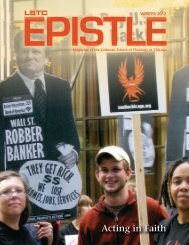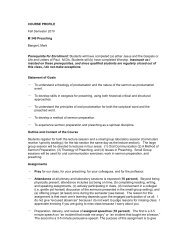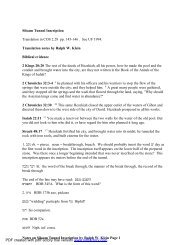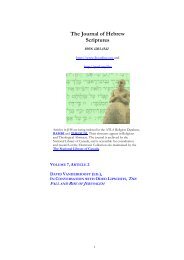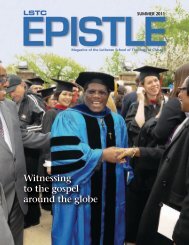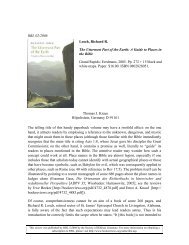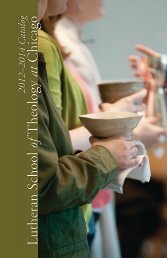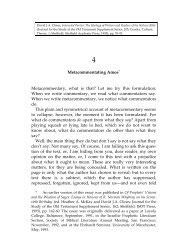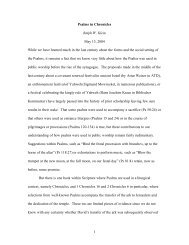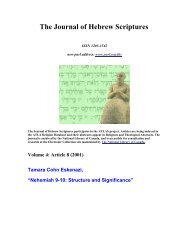The Ironic End of Joash in Chronicles - Fontes - Lutheran School of ...
The Ironic End of Joash in Chronicles - Fontes - Lutheran School of ...
The Ironic End of Joash in Chronicles - Fontes - Lutheran School of ...
Create successful ePaper yourself
Turn your PDF publications into a flip-book with our unique Google optimized e-Paper software.
as a tax legislated by Moses orig<strong>in</strong>ally for the tabernacle (Exod. 30:11-16; 38:25-26) butnow121due to the temple as well. <strong>The</strong> need for repairs is laid at the feet <strong>of</strong> Athaliah and hersons 16 <strong>in</strong> v. 7, who are accused <strong>of</strong> break<strong>in</strong>g <strong>in</strong>to the temple and us<strong>in</strong>g its votive giftsfor the Baals. <strong>The</strong> damage to the temple was not due to negligence by the clergy. InK<strong>in</strong>gs, on the other hand, <strong>Joash</strong> had asked the priests to provide funds for repair <strong>of</strong> thetemple from their own regular <strong>in</strong>come, and he discovered that no repairs to the templehad been made after twenty-three years! He then reprimanded Jehoiada for notrepair<strong>in</strong>g the house and ruled that the priests would receive no more money directly,although they would not be required to f<strong>in</strong>ance repairs to the temple.2. In K<strong>in</strong>gs, <strong>Joash</strong> proposed that the contributions be deposited <strong>in</strong> a chest he placed <strong>in</strong>the temple, thus avoid<strong>in</strong>g the priests as <strong>in</strong>termediaries. One <strong>of</strong> the k<strong>in</strong>g's <strong>of</strong>ficials andthe high priest 17 would count the money and turn it over to those supervis<strong>in</strong>g therepairs <strong>in</strong> the temple. Cultic utensils did not have to be f<strong>in</strong>anced from these funds, andthe priests were provided with restricted <strong>in</strong>come from the guilt and s<strong>in</strong> <strong>of</strong>fer<strong>in</strong>gs. <strong>The</strong>Chronicler moved the chest outside the gate <strong>of</strong> the temple where laypeople coulddeposit their money directly and not violate the hol<strong>in</strong>ess <strong>of</strong> the sanctuary. <strong>The</strong>proclamation reported <strong>in</strong> 2 Chron. 24:9 may reflect a communication strategy fromthe Persian period (cf. 2 Chron. 30:5; 36:22; Ezra 1:1; 10:7; Neh. 8:10). 18 In anycase, the people joyfully paid this tax <strong>in</strong> great amounts, thus sett<strong>in</strong>g an example forthe Chronicler's audience. Both the k<strong>in</strong>g and the high priest <strong>in</strong> <strong>Chronicles</strong> arerepresented by an <strong>of</strong>ficial <strong>in</strong> the count<strong>in</strong>g <strong>of</strong> the money, correct<strong>in</strong>g an impressionfrom K<strong>in</strong>gs that the high priest and the scribe <strong>of</strong> the k<strong>in</strong>g were equal <strong>in</strong> rank. In<strong>Chronicles</strong> the high priest is roughly equal to the k<strong>in</strong>g himself. Excess funds gatheredfrom the people were used to f<strong>in</strong>ance or provide raw material for cultic vessels - <strong>in</strong>direct contradiction to K<strong>in</strong>gs. <strong>The</strong> existence <strong>of</strong> such surplus silver emphasizes the size<strong>of</strong> the people's gifts. S<strong>in</strong>ce there were no longer k<strong>in</strong>gs to provide these cultic vesselsafter the exile, the Chronicler may be provid<strong>in</strong>g an etiology for the provision <strong>of</strong> culticvessels <strong>in</strong> his own time. 1916. Athaliah had attempted to wipe out the royal family (2 Chron. 22:10), and variousmembers <strong>of</strong> the family had been killed <strong>in</strong> earlier <strong>in</strong>cidents (2 Chron. 21:4; 22:1). Perhapsthe term "sons" here should be understood as her "adherents."17. This may <strong>in</strong>dicate mutual suspicion between the k<strong>in</strong>g and the priesthood that couldonly be assuaged by their count<strong>in</strong>g the funds together. On the other hand, there is norequired accountability for those supervis<strong>in</strong>g the repair work. Cf. 2 K<strong>in</strong>gs 22:7 // 2 Chron.34:12. <strong>The</strong> contractors were trusted more than the priests!18. See Michael Fishbane, Biblical Interpretation <strong>in</strong> Ancient Israel (Oxford: ClarendonPress, 1985), 159.19. Wilhelm Rudolph, Chronikbacher (HAT 21; Tub<strong>in</strong>gen: Mohr [Siebeck], 1955), 277.



